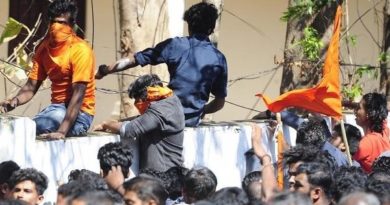Jamiat Ahlehadees Hyderabad issues advisory guidelines to protest India’s Citizenship Law
Hyderabad (India) – The Jamiat Ahle-Hadees organization of India’s Telangana state on Thursday issued a set of advisory guidelines pertaining to the nation-wide protests going on against the controversial Citizenship Amendment Bill (CAB).
Hussain bin Osman Madani, the general secretary of state level Jamiat, drafted the guidelines after an intensive meeting among the scholars and the Jamiat’s advisory board, held at Jamiat headquarters located in Langerhouse, Hyderabad.
A general advice to the Indian Muslims is made to strengthen the overall relationships with the people who follow different methodologies and schools of thought, and people of other religions for humanitarian, social, ethical and moral reasons, while keeping in mind the fragility of the situation of Muslim community and the national interest.
Furthermore, it advises Muslims to commit oneself to the religion of Islam, strengthen the faith, and get closer to God.
“Make supplications and prayers to protect oneself from the trials and oppression of the oppressors. Especially, ask Allah for the forgiveness, and keep offering Qunoot-e-Naazila prayers,” as stated in the guidelines.
Moreover, it emphasizes that importance of forming a Joint Action Committee (JAC) after consulting the Islamic scholars, law experts, and local Muslim leaders. The committee will align with Islamic guidelines and the Indian constitution.
It states that, “media should not be trusted blindly rather preference should be given to interact with the known people to authenticate the news”.
“Any initiative at community and national level issues should not be taken unless consulted with JAC and Muslim leadership.”
It also highlighted the potential danger of apostasy that entails CAB and NRC, that is, the detained Muslims will be left with no choice to renounce their faith. “Awareness campaign should be made to teach about the potential seriousness of trial of apostasy,” it states.
“Cooperate with Muslim leadership and follow the approval of JAC for peaceful protests,” it also highlights.
Meanwhile, it also suggested to keep all the required documents ready as a precautionary method, but the submission to the government to be done as per the instructions of JAC.
The guidelines are given in context of the controversial CAB bill passed by the Indian parliament passed CAB on December 11 2019 after heavy debates in both the houses of parliament.
The bill grants Indian citizenship to the followers of six religions Hinduism, Sikhism, Buddhism, Jainism, Parsi faith and Christianity. However, Muslims are not eligible for citizenship.
The controversial bill drew heavy criticism from United Nations, stating it as a “fundamentally discriminatory in nature”.



